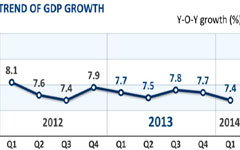That trend has partly coincided with Shanghai's evolving structure of economic output, with over 62 percent of its gross domestic product being generated by the service sector. It also means opportunities in the segment are much more wide-spread than in manufacturing, said Simon Northcott, principal consultant of Competitive Capabilities International China.
 |
 |
CCI's business was buoyed by companies' growing willingness to invest in improving productivity, Northcott said. More companies in Shanghai are increasingly sophisticated, and their demands on promoting services are rapidly rising, he said.
Robert Theleen, CEO of the ChinaVest Ltd and chairman of the American Chamber of Commerce in Shanghai, said China's commitment to economic liberalization through initiatives such as the China (Shanghai) Pilot Free Trade Zone show it's only natural more firms are setting up in the country.
"When you combine this improving infrastructure with the decades of experience that American businesses now have in this market, it's easier for US companies to profit from China's growth, regardless of their size," he said.
Wingo from China Sage echoed that. Proposed policy changes, including facilitating trade and allowing financial liberalization, could eventually afford big benefits to foreign SMEs. That may include available, reasonably priced financing for capital investment and business transactions and a more efficient import process at a lower cost.
"SMEs should be able to focus more on the business at hand and less on inefficient maneuvering to get things done," Wingo said. "You can imagine the increase in operational flexibility that theoretically could be enjoyed within the FTZ."
|
 |
 |
| China's top 10 richest cities |
